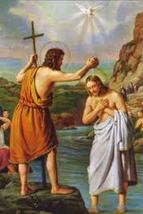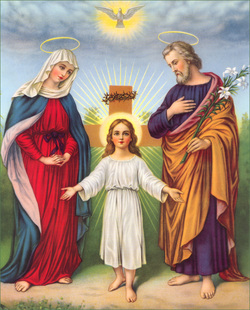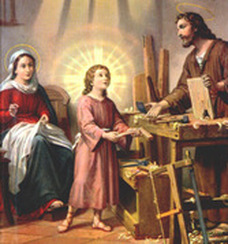
Who was this extraordinary man? People said he was the son of the priest Zachary, who, thirty years ago, whilst offering incense in the Temple had seen an Angel and been struck dumb by the vision. His name was John. He had spent his life from childhood in the desert, where his food was locusts and wild honey. And now he had suddenly appeared on the borders of his desert and was telling the crowds who went out to see him that they must repent of their sins and prepare for the Messiah, for the Kingdom of Heaven was at hand.
"The Kingdom, the Messiah's Kingdom at hand!"
A cry of rapture rang through the land. He was near, then, who should free them from bondage and raise the fallen fortunes of Israel; who should march at their head against the heathen Gentiles, bring the whole earth under His rule, and begin a thousand years' reign of prosperity and glory for the people of God! Men, women and children from Jerusalem and all the country about the Jordan, nay, from distant towns and villages, flocked in thousands to the wilderness—Pharisees and Sadducees, priests, publicans, soldiers, forgetting in the common joy and expectancy their mutual jealousy and hate.
But John's speech to them was not of coming pomp and pleasure, but of penance. He flattered none; he told all to confess their sins and be baptized. In stern and fearless words he rebuked the proud, the self-indulgent, the unrepenting sinner. Seeing among the crowd some Pharisees and Sadducees, he cried out:
"Ye offspring of vipers, who hath shewed you to flee from the wrath to come?"
But he spoke gently to the humble and the poor. Standing one day on a hillock, his voice thundered over the wilderness:
"Now the axe is laid to the root of the trees. Every tree, therefore, that bringeth not forth good fruit, shall be cut down and cast into the fire."
The people terrified cried out :
"What, then, shall we do?" and he said:
"He that hath two coats, let him give to him that hath none, and he that hath meat let him do in like manner."
And the publicans who came to be baptized said to him : "Master, what shall we do?"
And he said to them : " Do nothing more than that which is appointed you." For as collectors of taxes they were accustomed to cheat.
And the soldiers also asked him saying: "And what shall we do ?"
And he said to them : " Do violence to no man, neither accuse any falsely, and be content with your pay."
He did not tell men to lead a hard life like his own, but to keep the Commandments of God and be faithful to the duties of their state of life. In this way they would be getting ready for the Messiah.
The rugged appearance and stern speech of the young preacher, so far from scaring the people away, drew them to him. His words that the Messiah was about to appear caused the greatest excitement throughout the country; thousands were baptized by him in the Jordan confessing their sins, and disciples began to gather round him. And as people were thinking that perhaps John might be the Christ, he said to them:
"I indeed baptize you with water, but there shall come One mightier than I, the latchet of whose shoes I am not worthy to loose. He shall baptize you with the Holy Ghost and with fire."
The Coming of Christ—this was always the subject of his instructions. It was this that made his dark eye kindle and his countenance glow. Men who knew how stern his speech could be marvelled at the burning love that from his heart overflowed upon his lips when he spoke of Him whose messenger and forerunner he was.
Day by day his words of prophecy grew clearer, and the expectation of his hearers more intense. The Messiah was close at hand. John had said it, and all men held John to be a prophet. He was at hand; when and where would He show Himself? One day John was preaching as usual and as usual the stillness of the vast audience showed that his words
were reaching every heart. Suddenly he broke on and fixed his gaze with a look of reverent wonder on something or someone at a distance. All eyes followed his.
From the midst of the throng a Man was quietly advancing towards the little height on which the Baptist stood. His garments were poor, yet there was an indescribable majesty about Him joined to an innocence, simplicity and gentleness capable of winning every heart. He was a stranger, unknown to all but one. John saw Him, knew Him, and his heart leapt forth to welcome Him.
Painters have loved to show us the little Baptist standing with the Child Jesus at Mary's knee. The two were cousins, but we are not told that they had ever seen each other before this meeting by the Jordan. How, then, did John know our Blessed Lord? He himself tells us : "I saw the Spirit coming down as a dove from Heaven upon Him." The Precursor thought his work was now done; the Master had come, it was the place of the servant to retire. What, then, was his amazement and awe when our Lord, mingling with the sinners who were coming down to the water, and waiting His turn, stood at length before Him and humbly asked for baptism.
"I ought to be baptized by Thee," he said trembling, "and comest Thou to me ?"
"Suffer it to be so now," replied Jesus in a low tone, "for so it becometh us to fulfil all justice."
Then John with reverent hand poured the water on that sacred head, and that which was one day to make us children of God and heirs of Heaven was consecrated by the Baptism of Christ. As He came out of the water there was a glorious sight: the heavens opened, and in the midst of dazzling light the form of a Dove with outstretched wings was seen to overshadow Him, whilst a Voice like soft thunder was heard:
"Thou art My Beloved Son, in Thee I am well pleased."
This is the first time the Holy Trinity, One God in Three Persons, showed Itself to men—the Father in the Voice from Heaven, the Son in the Sacred Human Nature, the Holy Ghost in the form of a Dove. The Hidden Life was over, our Lord's Public Life had begun, and it began with an act of deep humility. But He that humbleth himself shall be exalted. So it has ever been; so it was by the Jordan now. Christ, the All-Holy, had humbled Himself, appearing among sinners as a sinner. And His Father had glorified Him by declaring before that vast multitude that He was no sinner but His own well Beloved Son.
We might have thought that at last His time for preaching had come. He was thirty years of age; the people prepared by John were in eager expectation. They had heard Him proclaimed from Heaven to be the Son of God. How they would flock to Him and welcome Him if He were to come among them and teach them now!
But God's ways are not like ours. Our Lord was indeed going to teach, not, however, the people of His own land, but His followers in every land and throughout all time, to teach us all one of the most important lessons we have to learn in this world. And He was going to a battlefield to meet a cruel and powerful adversary. What was this lesson? where was this battlefield? Let us follow Him and see.
A printable file of this chapter as well as a coloring picture can be found below.
|
| ||||


 RSS Feed
RSS Feed